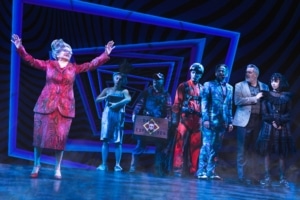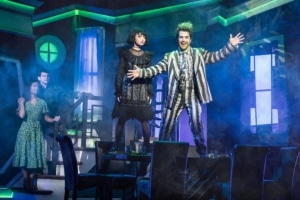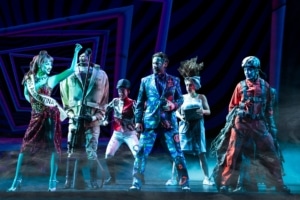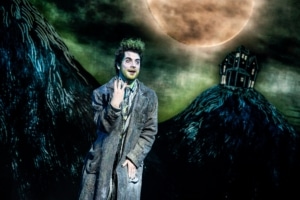DCPA NEWS CENTER
Enjoy the best stories and perspectives from the theatre world today.
Enjoy the best stories and perspectives from the theatre world today.
Bringing Beetlejuice to the stage was never going to be a simple task. Fans of Tim Burton’s 1988 comedy-horror film are legion, and devoted to the work of the visionary artist and director. So when director Alex Timbers assembled his design team for the Broadway musical, he brought in some heavy hitters, including six-time Tony Award winner William Ivey Long for costume design; Michael Curry, who had created the puppets for The Lion King with Julie Taymor, and Jeremy Chernick, who had created special effects for Frozen and Harry Potter and the Cursed Child.

Pictured (L-R) Karmine Alers (Juno), Tour Company of Beetlejuice, Jesse Sharp (Charles) and Isabella Esler (Lydia). Photo by Matthew Murphy, 2022
Beetlejuice, however, was going to take more than the usual visual splendor of a Broadway stage. It was going to require magic. For that, Timbers turned to Michael Weber, an illusionist with deep roots in the magic community. It would fall to Weber to make characters appear and disappear, bringing to the stage the transitions between life and death, real and unreal.
“One of the things I tried to do was that the illusion components would always have some kind of Tim Burton hat tip without mirroring anything that happened in the film,” Weber says. “The show is full of illusions top to bottom. There are remarkable projection effects and those create amazing visual illusions. The lighting also has illusory components.”
Weber came to magic early. As a teen in Southern California, he joined the Long Beach Mystics, a club created by young magicians. “Most of the magic clubs were run by adults, so there were lots of politics and people with money or power or control, or who wanted power or control,” he says. “But the great thing about the Long Beach Mystics was it was by young people who were serious about magic by and for us. We would meet every other Thursday at a high school auditorium, and the rule was, you had to perform at every meeting. There were people who performed the same thing over and over again and people who weren’t as smart, like me, who tried something different every time.”

Pictured (L-R) Britney Coleman (Barbara), Will Burton (Adam), Isabella Esler (Lydia) and Justin Collette (Beetlejuice). Photo by Matthew Murphy, 2022
By the time he was 14, Weber had auditioned and been accepted by the Junior Society of the Magic Castle, the famed and exclusive Los Angeles magicians’ clubhouse. There, he honed his craft and was taken under the mentorship of the great sleight-of-hand artist, Charlie Miller. Miller introduced Weber to another of his proteges, Ricky Jay. Together, the two formed a business, Deceptive Practice, and Weber by his twenties was making Gary Sinise’s legs disappear in Forrest Gump and creating a ladder of light for the original Broadway production of Angels in America.” That mentorship relationship, shared by Weber and Jay with Miller, is one of the many traditions that the world of magic still maintains.
“I think [it works] when both parties are very fortunate and open to that vulnerability, because the mentor has to be willing to share, and the mentee, the apprentice, has to be willing to listen,” Weber says. “The internet gives you access to everything. Now that you have access to everything, what are you going to do with it? When you had to earn a secret, you had to think about what you were willing to do to gain access to those secrets.”

Danielle Marie Gonzalez (Miss Argentina) and Tour Company of Beetlejuice. Photo by Matthew Murphy, 2022
The secrets to Beetlejuice, however, cannot be found on the internet, Weber emphasizes. “I’m one of those kind of old-school, hard-and-fast rule magicians who think secrets still work. I think the only magic is what appears live in the room. It’s filled with illusion not to fool you, but to create a convincing alternative reality.”
Going from film to stage required a number of fresh creations, all retaining Burton’s original aesthetic. “When incorporating illusions into a show, all the departments kind of have the same job: to drive the story. Maybe there’s a puff of smoke, or a bolt of lightning, or something that catches on fire. That magic serves a story purpose. So one of the really interesting things about designing bigger illusions – and lots of people appear and disappear onstage in Beetlejuice – is that there’s no stopping the traffic there.”
It’s a bit different from working as a solo magician with an audience. “What makes an illusion for a Broadway show different from a show with one person on stage who is the titular magician, is the person onstage is an actor playing the part of someone who has these powers. There’s ordinarily not a bigger story around it,” Weber says.

Justin Collette (Beetlejuice). Photo by Matthew Murphy, 2022
For example, the Maitlands, who have died at the beginning of the action, are living in the attic, trying to figure out how to survive as the dead, and how to preserve their beloved home. “Part of their journey is discovering what their powers are in this new state,” Weber says. “How can they use them to get what they want? And it takes them a little while to figure out what they want.
“So what one has to do in terms of the design elements is [determine], where is this character coming from? What are their powers, what is the magic of their character? Can it be quick? Do we have to do it in the middle of nothing? There are one or two moments where characters have to levitate, and that just happens in the middle of everything, there’s no room for wires or anything.”
At its core, though, Beetlejuice is about more than sleight of hand and flash pots. “It’s a show about family,” Weber explains. “It’s a show about the families that we have, the families that we get, the families we wish we had and the secondary families that we build.”
DETAILS
Beetlejuice
September 5 – 17, 2023 ∙ Buell Theatre
Tickets
